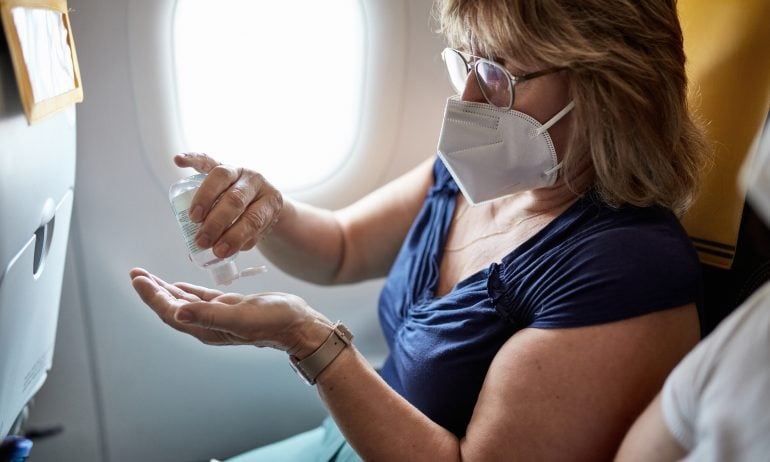How to Avoid Getting Sick on a Plane

Many, or all, of the products featured on this page are from our advertising partners who compensate us when you take certain actions on our website or click to take an action on their website. However, this does not influence our evaluations. Our opinions are our own. Here is a list of our partners and here's how we make money.
Travel has been picking up lately as countries and states have been reopening for tourism. If you’re thinking of traveling internationally, the Centers for Disease Control and Prevention recommends that you get fully vaccinated so that you'll be less likely to catch and spread the coronavirus (though you can travel without a COVID vaccine). However, even after you’ve been vaccinated, there are things you can do to keep yourself healthier while in transit.
Here are seven steps you can take to avoid getting sick on a plane.
Ways to prevent getting sick on a plane
You don't have to be a traveling germaphobe to want to avoid coming down with a cold, flu or worse.
1. Wash your hands and use hand sanitizer with 60% or more alcohol
Wash your hands with soap and water when possible, as that's more effective at killing certain germs than hand sanitizer. The CDC suggests that if soap and water aren't available, use a hand sanitizer that contains at least 60% alcohol. Hand sanitizers with 60%-95% alcohol are more effective at preventing you from getting sick and spreading your germs to others.
Hand sanitizer comes in small sizes, and you're now allowed up to a 12-ounce bottle of sanitizer in carry-on luggage. You can even get sanitizing wipes to carry in your bag.
» Learn more: Do I need a COVID booster for travel?
2. Clean the airplane seat with sanitizing wipes
Due to COVID-19, airlines sometimes give out alcohol-based disinfectant wipes to passengers as they board. Use these wipes (or bring your own) to clean your seat, headrest, armrests, tray table, entertainment screen and anything else you may touch while sitting in your seat.
If you need extra wipes, don’t hesitate to ask, as they're usually readily available on flights.
» Learn more: The best airlines to fly during the COVID-era
3. Wear a mask, even when not required
Though the days of masking mandates seem to be behind us, wearing one when flying can provide additional protection from getting sick. A mask will also keep you from touching your nose and mouth with your hands.
And according to the CDC, it's a good idea to wear a mask in any transportation mode or hub while traveling, such as a train, subway, bus station or even rideshare pickup area.
4. Pick a window seat
Window seats experience less traffic than aisle or middle seats. When you’re sitting by a window, there's no one passing by you. Conversely, when you’re sitting in an aisle seat, you’ll be near a lot of traffic: passengers walking to their seats or the restroom and flight attendants walking down the aisles to serve food and collect waste.
All that extra traffic puts you in closer proximity to someone who may be ill. So to reduce your chances of getting sick, stick with a window seat.
» Learn more: What to look for in airline seat reviews
5. Keep your things in overhead bins
While it can be annoying to keep your stuff in overhead bins instead of by your feet, it can make good health sense. Putting your backpack, purse and other items on the floor means they're right next to your shoes (a haven of germs). Or worse, you might put your feet directly on top of your things.
By doing so, you’re exposing your personal items to all the germs on the airplane floor and your soles. In addition, you may be picking up germs from previous passengers who had their shoes and items on the floor, especially if the aircraft wasn’t vacuumed by your seat.
For things you want to keep close at hand, consider using the seatback pocket or a bag you'll get rid of after the flight.
If you’re not in a hurry, you may want to check the bulk of your luggage instead.
6. Travel with your medicine
Avoid packing medicine in your checked luggage in case you need it during the flight or your luggage gets lost or delayed. Even if you’re traveling to a destination where you think the medication is easily accessible, you’ll save time and money (and stress) by carrying it on board.
Consider any prescription medications you take, as well as over-the-counter items you may need, such as pain relievers, indigestion tablets or vitamins. If you start to feel unwell on the plane, these medications can help manage your symptoms and keep you comfortable.
7. Travel with electrolytes
Traveling with a packet of dissolvable electrolytes for your water or purchasing a vitamin drink at the airport are good ways to hydrate yourself with more than just water. This approach can be particularly helpful if you’re already dehydrated or start to feel nauseous.
According to Healthline, a health and wellness advice website, electrolytes are necessary for controlling blood pressure, regulating fluid balance, helping muscles contract and maintaining appropriate pH levels in the blood. Electrolyte waters are usually enhanced with minerals such as sodium, potassium, magnesium and chloride, all of which help your body function properly.
If you’re trying to prevent getting sick on a plane, staying hydrated and replenishing with electrolyte water can be beneficial.
Decrease your chances of getting sick after air travel
Although it's impossible to completely eliminate all chances of getting sick while traveling on a plane, there are steps you can take to mitigate your exposure to germs. Whether it’s packing a few extra health-related items or simply changing where you sit, you can increase the chances of staying healthy with some easy modifications to your habits.
How to maximize your rewards
You want a travel credit card that prioritizes what’s important to you. Here are our picks for the best travel credit cards of 2023, including those best for:
Flexibility, point transfers and a large bonus: Chase Sapphire Preferred® Card
No annual fee: Bank of America® Travel Rewards credit card
Flat-rate travel rewards: Capital One Venture Rewards Credit Card
Bonus travel rewards and high-end perks: Chase Sapphire Reserve®
Luxury perks: The Platinum Card® from American Express
Business travelers: Ink Business Preferred® Credit Card
on Chase's website
1x-5x
Points60,000
Pointson Chase's website
1.5%-5%
CashbackUp to $300
2x-5x
Miles75,000
Miles




